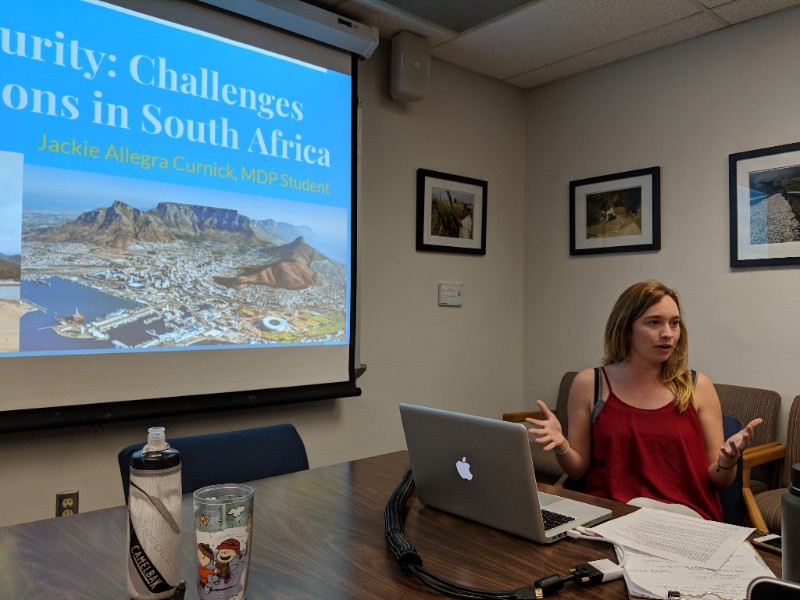 University of Florida MDP student, Jackie Curnick, presented on “Water Security and Rainwater Catchment Systems in Eastern Cape, South Africa,” at the February 5th SCAD meeting. Her lecture centered on the water crisis in Cape Town as the city approaches “Day Zero,” when water will run out in the city, making it the first major city to run out of water. Day Zero is predicted to happen on April 16th,which will result in citywide water restrictions.
University of Florida MDP student, Jackie Curnick, presented on “Water Security and Rainwater Catchment Systems in Eastern Cape, South Africa,” at the February 5th SCAD meeting. Her lecture centered on the water crisis in Cape Town as the city approaches “Day Zero,” when water will run out in the city, making it the first major city to run out of water. Day Zero is predicted to happen on April 16th,which will result in citywide water restrictions.
Cape Town is experiencing this water crisis because of climate change, drought, water infrastructure in the region, and growing demands from rising population sizes. Politics have impacted the impending water restrictions. Although the local government began preparing in 2007 for potential water crises, conflicts with federal government bodies limited the abilities of Cape Town officials to react and prepare. Only 55% of Capetonians are currently following water restrictions. Inequality and poverty within Cape Town has also been exacerbated by water constraints, as the rich can afford fines for using extra water while the poorest 25% of the city only use 4.5% of water and typically are constrained by having to retrieve water daily. The water crisis has also resulted in agricultural decline throughout the country, public health implications, and has had impacts on wildlife and tourism.
Curnick considered the possible solutions as well as how she would approach the water crisis as a development practitioner in the second half of the presentation. Currently, potential solutions to the water crisis include water rationing—the primary plan, where there will be 200 distribution centers and 6.5 gallons per person distributed at Day Zero. The Cape Town city council has also ordered drilling into the aquifer, and other plans have been proposed to desalinate water privately to sell to the government. Other possible solutions include recycling wastewater, promoting household water tanks, improved allocations, building on political relationships, and implementing strategic development efforts. Curnick discussed how she would potentially address the water crisis in Cape Town, first with a research phase, then implementing the installation of water tanks, and finally monitoring and evaluation.